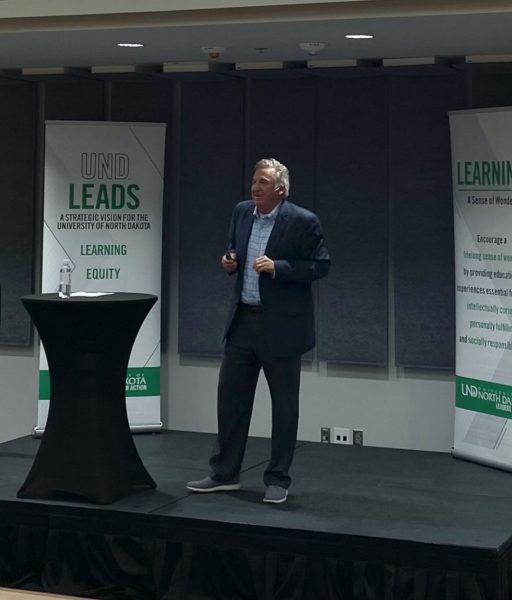Olafson ethics symposium held at the Memorial Union
Dakota Student / Nicholas Nelson
UND alumnus and former Cargill CEO Greg Page speaks with provost Thomas DiLorenzo during Thursday’s Olaf Ethis Symposium at the Memorial Union Ballroom.
November 8, 2016
The Memorial Union Ballroom filled with students and community members interested in business ethics right before the 12th annual Olafson Ethics Symposium, a yearly question and answer seminar between students, community members and the speaker.
This year, Greg Page, the former chairman and CEO of Cargill answered many questions on business ethics with the help of moderator Tom DiLorenzo, UND Vice President for Academic Affairs.
“The purpose of the Olafson Ethics Symposium is to provide a platform for students and the business community to explore the importance of both personal and professional ethics.” Margaret Williams, the Dean of the college of Business and Public Administration, said while introducing Page to the audience.
While Page was at the helm of Cargill, he helped the company grow and focus its operations on innovation and premium products.
Page is an alum from UND with a bachelor’s degree in economics. He remains active in the community with his interest in events like the symposium and having sponsored over 150 scholarships given out to students at UND. He is also a former Sioux Award winner.
Before announcing his retirement in 2015, Page worked with Cargill since 1974. Working his way up the management chain, Page had the opportunity to spearhead large projects that required some tough decisions.
The seven guiding principles Cargill has implemented to make up the company’s ethics has aided in Page’s decisions. The seven principles are “We obey the law, we conduct our business with integrity, we keep accurate and honest records, we honor our business obligations, we treat people with dignity and respect, we protect Cargill’s information, assets and interests, and we are committed to being a responsible global citizen,” according to Cargill’s website.
On the topic of environmental ethics, Page was tasked to work in Thailand on Cargill’s poultry processing exports for Japan. During his time, he noticed the great opportunity Thailand had in implementing wastewater management facilities.
“Out of everybody who invested in wastewater treatment facilities, nobody chose to run it,” Page said. “Within the seven guided principles, there was a law to process waste water.”
Thailand didn’t have any infrastructure for reusing dirty water because of the high cost of electricity in the country. Page believes Cargill showed the way by promoting renewable resource treatment centers in Thailand. Now, Page believes it will be difficult to find a food processing business that doesn’t use wastewater treatment.
While president of Cargill, Page implemented a carbon-reduction program across the entire company. The goal was to reduce carbon emissions by one percent every year. 19 years later, Cargill has slashed their carbon emissions by 19 percent.
The Minneapolis-based company provides food, agriculture and industrial products around the world with over 150,000 employees in 70 countries, according to the Cargill’s website.
Nick Sallen is the editor-in-chief for the Dakota Student. He can be reached at [email protected]












